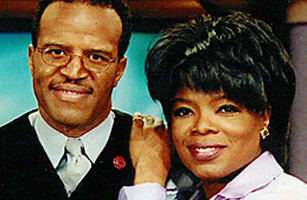
People have said they expected the four officers involved in the Rodney King beating to be set free. What were you thinking at the time?
I was going with my girlfriend to Palm Springs that day. She said she thought there would be a not guilty verdict. I said nonsense, there is rule of law, there is evidence. Despite the change of venue, the tape (of the Rodney King beating) was the kiss of death. I thought there would be a guilty verdict, but the officers were acquitted. I felt fooled because I thought discrimination had been solved and there was justice.
Many remember where they were and what they were doing when the riot started. What was the situation for you?
Well, I'm standing in my office, the verdict comes in and at about 4 p.m. I start to see smoke breweing from the east side of my window view which was East L.A. Out of guilt I shut down my office and went to First A.M.E. Church. The gentleman who who spiritually raised me, Rev. (Cecil) Murray was there. As I walked in the door Pete Wilson was on one side of me and Jesse Jackson was on the other side.
So all this caught you off guard?
The only person that I knew who was surprised was me. I thought it would all work out. But many said the officers would get off, and said we'll have to do the best we can to keep everyone calm.
After the first few days, you needed a plan of action. What was it?
I felt useless frustrated and guilty. I asked Rev. Murray what could I do to help. He said "take your businsess deals and put them to work." So I went back to my office and put in calls to bankers, police, and media people and on May 5, we did a Banker's Bus Tour while the embers were still burning.
How did thing begin to come back together? Were there lots of people who had the same idea as you?
Many left corporate jobs to be part of organizations that would help put South Central Los Angeles back on track. The federal government said it was coming in with an assistance package, but the amount needed never happened. It took the community to rebuild itself.
After all the damage, who came to the rescue?
The initial response was my Lord you're going to have an overabundance of things; venture capital, loans, and so on. And for the first 18 months there was an overabundance. There were thousands of non-profits created after the riots. Everyone and their mother had an idea how to rebuild L.A. Conservatives had ideas, liberals had ideas, et cetera. But after three years it set in that a lot of the hoopla had ended. And many came to the realization that they had to make money. There were people who used this as an opportunity to make money. People began starting non profits to get money coming form heaven.
Then, what happened to all the non-profits since then?
Say there were 5000 non-profits. By 1994 or 95 that number got down to 250, by a year later there were 50. By 1996 there were 25, and by 1998, there were six groups. Today it's the same 6 or so groups. Ninety percent of the non profits that started after the riot are now dormant. I can only think of a few that have continued to make an imporint on this community. The people started walking away when the media started walking away. When the press conferences stopped getting covered, it got really lonely.
So who were the ones who were serious about staying for the long haul?
People like First A.M.E. Church, with Rev. Murray and Mark Whitlock, the Community Financial Resource Center, they and a few others continued to work along with Operation HOPE
How did Operation HOPE get off the ground in this sea of do-gooders?
The good and bad news was that nobody took me seriously. I wasn't put on Front Street for the scrutiny of everyone. So we tried different things. I found a pharmacist who the government wouldn't give a loan. They required three years of tax returns, but his burned up in the riot. So we underwrote him a loan commitment and a line of credit. Things like this were a mark of what we were going to become.
I said no matter what your color, if you want to eradicate poverty, you're my friend. In 1996, I visted a banker who asked me what I would do with $1 million. In 24 hours I came up with a plan for the HOPE Center and since then we've created 1,000 home owners.
You've said publicly before that Operation HOPE wants to help minority communities to help themselves. How do you teach neighborhoods like the ones in South Central to do that?
The charity and handout era is dead. Racism does exist but we've got to save our own lives. We have to get over it and get to it, so black and brown America have to speak a language of empowerment.